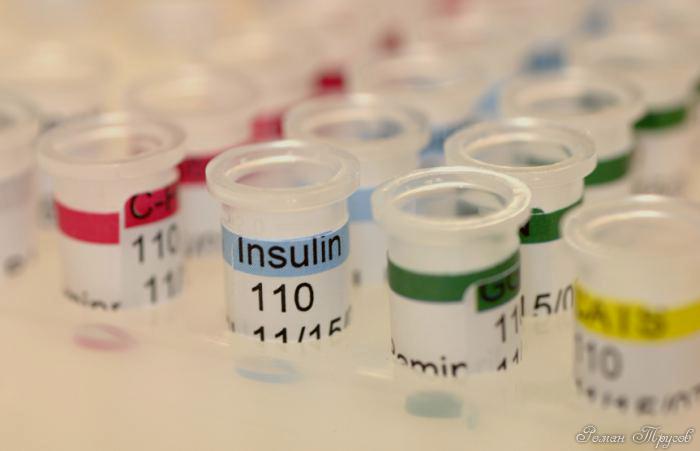Insulin - a hormone important for the body, formed in the pancreas and providing an extensive set of effects on the body's tissues. Its main function - reducing the amount of glucose in the blood. The hormone responsible for all the energy-exchange processes in the human body.
Description and norm
When a person eats a certain amount of carbohydrates, there is an increase of glucose in the body. Then, the pancreas begins to produce insulin, which stops its own production of glucose and begins to display it, spreading to all cells of the body. Also with the help of a hormone occurs in protein synthesis in muscle activation and accumulation of fat reserves.
Determination of the amount of insulin in the body helps to identify certain diseases. Normal values in the blood are directly dependent on the person's age. Baby normal values - from 3.0 to 20.0 uU / ml. In adults the concentration of the following: 3.0 to 26.0 uU / ml.
Insulin and food
To increase the amount of hormone in the blood, it is necessary to adhere to a low-carb diet. Eat more lean meat, sea fish, as well as cabbage, cucumbers and apples. Drink yogurt, eat blueberries, use as a seasoning parsley. Be sure to exclude from the diet of semolina, potatoes, rice and honey.
Reduce the level of insulin potassium rich foods: spinach, broccoli, Brussels sprouts. Actively eat carrots, zucchini and lettuce. Overlap should be on whole grain cereals, nuts and seeds: oat, soy, sesame and bran. Enter in your diet poultry meat, like cheese and skim milk much as possible is consumed.
Aberration
Increased amounts of the hormone signals the presence of type II diabetes. Also, too much insulin concentration may indicate liver problems, abuse resistance of cells to insulin and carbohydrates, of insulinoma (a tumor that produces a hormone), obesity and a number of other ailments. High levels of the hormone can also be the cause of polycystic ovaries in women (a common gynecological disease, with infertility).
Too low level indicative of juvenile diabetes of type I diabetes, a disease associated with problems in the functioning of the pituitary gland and diabetic coma. Any deviation can also talk about the problems with the pancreas.
